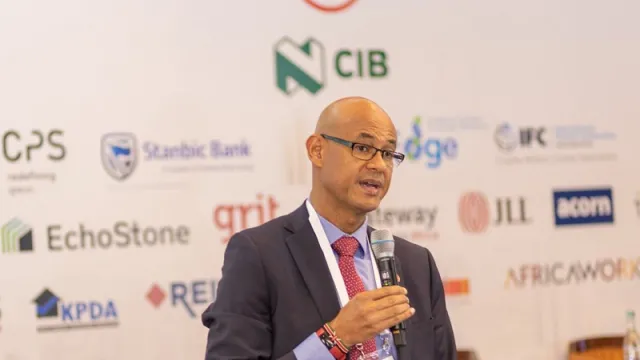Real estate industry zeroes in on green model to drive growth

Real estate industry zeroes in on green model to drive growth
A new wave of developing environmentally friendly real estate projects is sweeping across East Africa as the region breaks away from the shackles of the Covid-19 economic hit.
By coming up with Environmental, Social and Governance (ESG) compliant properties, the industry is evolving, and embracing a green approach that analysts say is more sustainable.
"In the commercial property finance sector, the initial focus has been on green initiatives that are of the economic benefit such as the installation of solar panels and implementation of methods to manage water consumption," Absa Bank Kenya Managing Director Jeremy Awori said during the 9th edition of East African Property Investment (EAPI) Summit in Nairobi.
Under ESG model, industry players create valuable impact within their organizations, the community, and the planet for years to come.
Globally, from energy to housing to auto sector, different firms are pushing toward green and sustainable development in their businesses.
Currently, asset owners also are adopting measures to achieve green certification of their buildings, creating an opportunity for capital markets to direct finances towards their sustainable projects
"We are keen on developing the requisite financial interventions that address these modern-day complexities. In 2020, we were recognized as a fully green building and the first bank in Kenya," added Mr Awori.
EAPI Summit host, Kfir Rusin, noted that East Africa’s economic recovery is attracting a lot of interest in the sector as attested by the over 300 representatives from leading financiers and players across the value chain attending the global event.
Read also: Regional property summit kicks off in Nairobi as Absa Bank eyes real estate
Some of the key fundamentals attracting investors across the region include improvements in infrastructure, and new statutory reforms supporting the real estate sector.
Further, Nairobi and Kigali are fast establishing themselves as economic and innovation hubs while ESG principles are driving investor, consumer, and occupier behavior besides the government’s continued focus on rolling out affordable housing projects.
Absa Kenya is a lending partner to the National Housing Corporation (NHC), which is a key enabler of Kenya’s National Government’s Affordable Housing Programme.
"Absa arranged a Kes1.24 billion facility for NHC to finance the development of three affordable housing projects and has enhanced its funding support by a further Kes2.56 billion, bringing the total investment to Kes3.8 billion," explained Mr Awori.
According to Nedbank CIB’s Head of African Property, Gerhard Zeelie, future developments are in danger of becoming irrelevant if they are not ESG compliant.
“Massively, European, US, and the Middle East investors are all focused on ESG and it is unlikely that assets will be marketable that does not comply with basic ESG.”
Absa’s Head of Africa Real Estate, Somaya Joshua, said the Bank has continued to debt fund commercial property across various sub-sectors, from retail in Uganda to offices in Tanzania.
A lot more funding has been extended in Kenya across the sectors, including offices, retail, housing, and industrial, she adds.
Estate Intel’s Tilda Mai said: “Flight to quality and the need for flexibility are emerging as clear drivers in the East African market driving demand across a range of sectors.
For example, despite a supply glut in Nairobi's office market, Grade A offices have continued to outperform other classes with some office parks such as the Garden City office park recording occupancy rates of up to 90 percent. The same can be said for Kampala and Dar es Salaam. With an influx of oil and gas occupiers expected in these markets, we expect demand for Grade A offices will only intensify."
Such trends are also trickling down to the logistics sector with demand for purpose-built warehousing increasing over the past 5 years leading to the build-up of global investors and developers such as GRIT and Agility setting their sights on the region.
Standard Bank’s Head of Real Estate Finance Africa Niyi Adeleye, however, believes it is increasingly critical to consider ESG, not from a purely green perspective.
"From an African perspective, we think it is important to consider all the parameters (ESG) of the measures as they continue to be topical and relevant as the sector evolves. It thus remains critically important to Standard Bank that our financing facilities are ESG compliant.”
For GTC Kenya’s Shamim Malowa, the HOPSCA-themed complex is symbolic of an economy that is developing fast.
"We are proud that we have skillfully initiated and implemented this project. It is a hub of economy, business, and living consumption within Nairobi, Africa, and International communities," she said.
With hundreds of delegates in attendance from 15 countries and more than 80 speakers, EAPI Summit is once again the center of fast-tracking opportunity and growth in the region's real estate sector.



